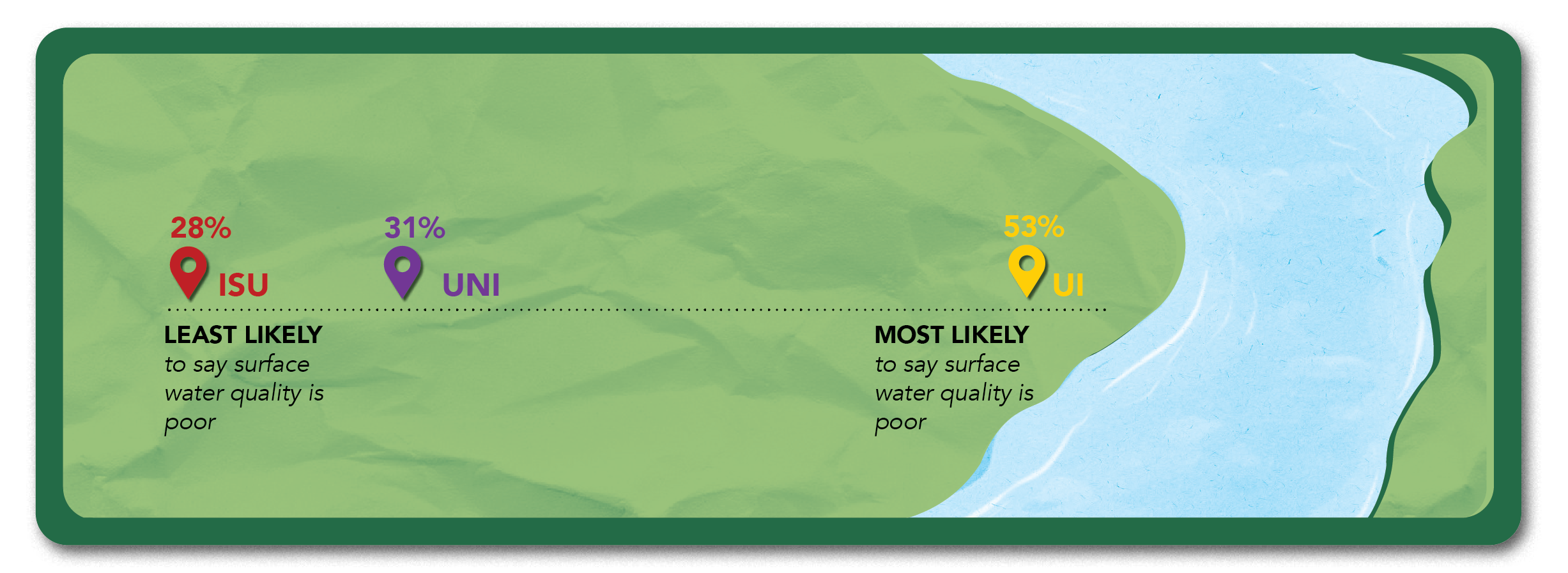Surface Water
Many of the participants in the urban listening sessions discussed the importance of Iowa’s surface waters to their quality of life and the frustration that pollution limits their ability to enjoy the water:
I owned a canoe since I was 12 years old. I moved to Central Iowa in 1988. And my wife and I’s first vacation trip was up to Backbone State Park with our canoe, and we couldn’t go in the lake. Our second trip was to Pine Lake State Park and we also couldn’t go in the lake. And now I live in Polk City, and used to go on Big Creek, and now I can’t go on Big Creek anymore. I think this is all quite ridiculous.
Male Urban
Farmers participating in the listening sessions viewed water as a resource to be managed or utilized for production:
I can show you the ditches that weren’t [always] there. And we’ve caused a lot of it ourselves. We send the chemicals down the ditch and it kills the sloughs and you can’t hold water anymore. The guy that done a lot of work for me, he goes, “When you get a frog choker [heavy rain], there’s nothing you’re going to do about holding water.” And you never control water. Water will beat you sooner or later.
Male Farmer
Students
Overall student opinions agree with those of the general public—73 percent rate surface water quality as fair or poor.
Proximity to the river and location within the watershed seem to affect student opinions of the surface water quality as well. The closer to the river and the further downstream the campus is located, the more likely students are to say that the water quality is fair or poor. Perhaps with surface water quality, familiarity could breed contempt.
This listening session exchange between a farmer and a university graduate student demonstrates that many Iowans have just gotten used to poor water quality:
Male Farmer: I’m probably the oldest person in the room, I’m sure. I grew up in a farm in western Johnson County along the Old Man’s Creek, which when I was five or so, you could swim in, you could eat the fish. There was no PFAS [Per- and Polyfluoroalkyl Substances] in the fish. You could literally drink the water, probably wasn’t wise even at that point. But literally, you can’t drink it now. You cannot fish in it, you cannot swim in it. You don’t even want your dog to be in it because on the off chance that your dog will develop some horrible malady from going into the water. So that’s the space of about 65 years or 70 years, about 70 years that I watched the water quality go from basically usable to basically unusable.
Female Graduate Student: Impaired.
Male Farmer: Very. Beyond impaired. Beyond impaired. You don’t want to get in it. Most rivers, if you’re a boater, you said, you really don’t want it to splash up on you.
Female Graduate Student: And it seems like we’ve accepted that. We’re just, “Oh well, guess we can’t use our waterways because they’re sewers now.”
What is the quality of surface waters (rivers, streams, lakes) in your area?
General Public
Respondents largely understand surface water quality to be poor. Among general public survey respondents, 71 percent view Iowa’s surface water quality as fair or poor.




